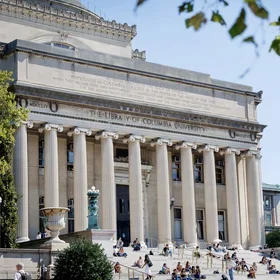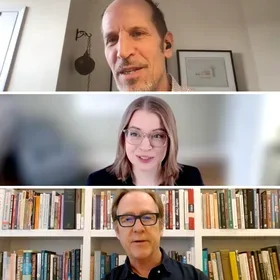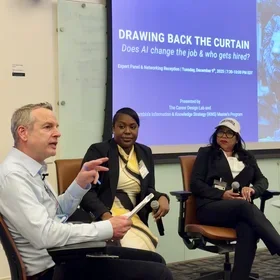Last week, the U.S. marked 31 years since the Americans with Disabilities Act was signed into federal law. The sweeping legislation protects people with disabilities from discrimination in employment, transportation, public accommodations, communications, and access to government services. A lifetime advocate for accessibility in education, DEIA committee member and Associate Director of SPS’s Learning Resources and Academic Technologies Domi Enders reflected on how the precision of language, self-assessment, and proactive policies can help to achieve diversity, equity, inclusion, and access.
Why did you nominate yourself for the DEIA committee?
I am extremely proud of Columbia SPS and this is a long time coming. I separately lead the accessibility and inclusion working group so I’ve always been involved with the effort of trying to build a culture around the concepts of access and accessibility, specifically digital accessibility. I have a passion for access in all of its forms. For me, the A in DEIA—the access—is the most important part because that’s when we take action. That’s when we say, for example, “We want our faculty body to be much more diverse; therefore, we’re going to implement the following policies—that’s access.
What do you hope to accomplish through this committee?
I hope to learn from everybody because it’s not like we’re all experts in this area so there’s a lot of learning to do and I think that’s a community effort. And as we learn more, we can include many more of our colleagues; I’m thrilled to see that all of the DEIA committee meetings are going to be open to all school stakeholders. I think that’s a really, really important step towards transparency. I am thrilled to participate in helping our community grow stronger and to build an understanding of common values and this is one very important way to do it. I think we have a sense of common values, but this is really our chance to get specific and say, “This is what we believe in, and this is what it looks like.” Hopefully, we’ll set an example for other schools at Columbia and elsewhere.
We have to shift to a common understanding that everyone is capable; it just looks different for everybody...
The system itself should be open, porous, and accountable enough to make everybody feel welcome... That way, no one’s going to have to ask for accommodations; everybody will have what they need to do their jobs effectively and everybody will feel equally capable, welcomed, and served."
What's a common misconception about people with disabilities as it relates to work?
When it comes to language, we have a lot of work to do. The use of the phrase “disability services,” for example, can be very off-putting. We have to shift to a common understanding that everyone is capable; it just looks different for everybody. I’ve believed that my entire life. There’s an unknown number of students who need accommodations but may not ask for them because we use the term “disability.” Here at SPS, we have students and faculty from many different cultures. In some cultures, a disability is something that you hide. 30% of all workers in the U.S. across fields are expected to need some kind of accommodation—whether temporary or permanent, according to a 2020 study published by the Center for Talent Innovation (CTI), a private think tank. The burden shouldn’t be on any one of us to ask for anything. The system itself should be open, porous, and accountable enough to make everybody feel welcome. The only way to do that is to be proactive. That way, no one’s going to have to ask for accommodations; everybody will have what they need to do their jobs effectively and everybody will feel equally capable, welcomed, and served—that’s the equity piece.
Another common misconception as it relates to DEIA overall is the assumption that “it’s someone else’s job” to implement these values. The common thinking sounds like this: “It’s not my problem. I’ve got a good attitude and I have respectful relationships with all of my colleagues.” But that’s not enough. I think the education field can really lead the way and should lead the way; we have the opportunity to do that.
What are some ways that professionals can make the workplace more inclusive of their colleagues who have various disabilities?
I would recommend that everyone take an implicit bias test. I learned so much when I did. We’re accountable to ourselves first; it would go a long way if we really understood where our blind spots are. What we discover in the midst of that is going to affect how a person teaches, how they relate to their peers, and pretty much every other interpersonal interaction. Self-assessment sets us up to start thinking differently about our thoughts, actions, and reactions.
At this point, I think everyone’s got to look inward, honestly. Take stock of where we are individually. The DEIA committee is going to help us understand where we are with these concepts and principles in our community at-large, our processes, our practices—as an institution—but that’s not going to make much sense unless we each look at ourselves through these lenses and really understand where our blind spots are. That awareness puts us in a position where we have something to offer.
The second thing to do is go out and learn! Learn about DEIA. This will change our school significantly for the better—by each of us taking up the challenge.


